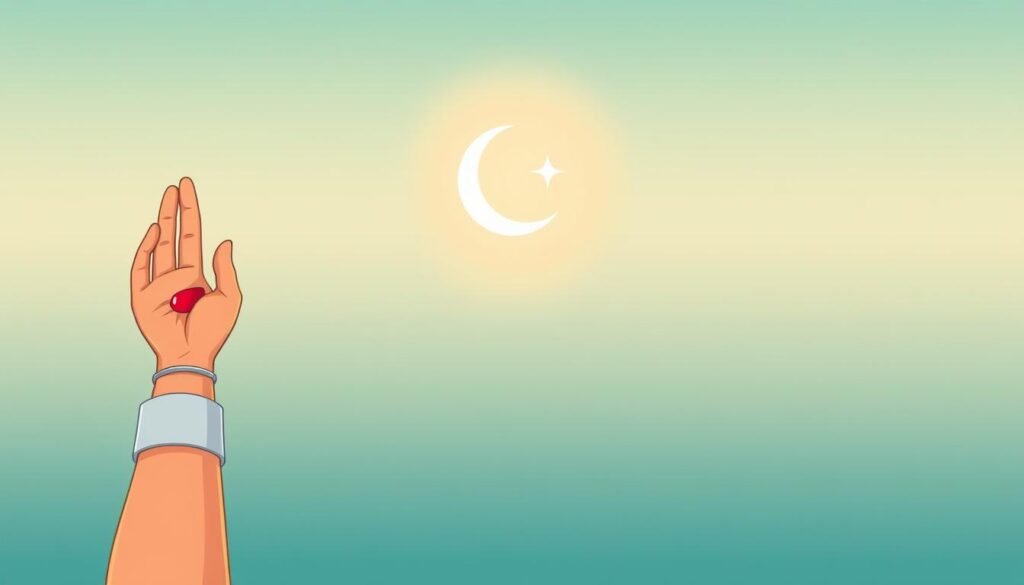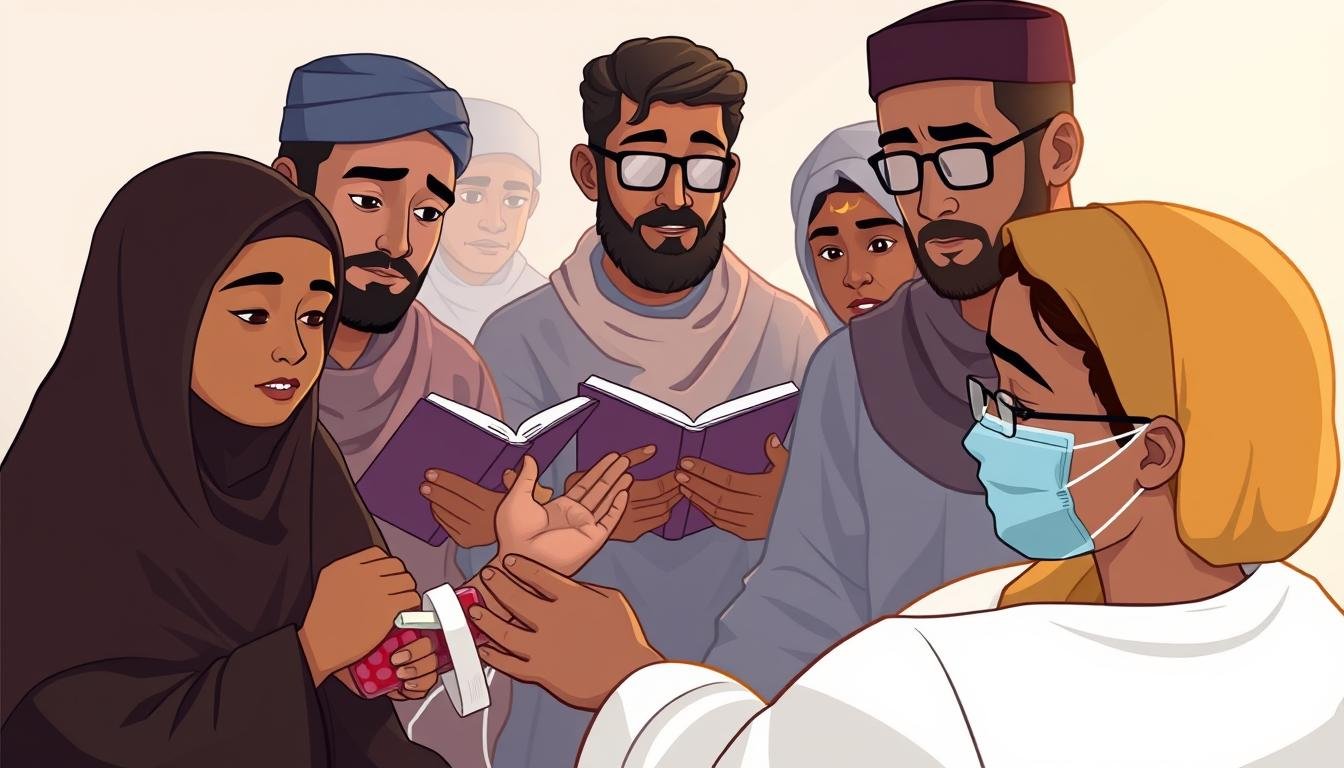Have you ever thought about if islamic rulings match modern health acts like blood donation? Many Muslims wonder if they can donate blood. They are caught between cultural doubts and the need to save lives.
Like the 31% of Muslims who support organ donation but are unsure, I’ve seen friends debate. They ask, “Is blood donation allowed in islam?” The answer is rooted in tradition and today’s urgent needs.
The Fiqh Council of North America’s 2018 fatwa on organ donation is a step forward. But blood donation’s status is unclear. In the U.S., over 100,000 need transplants, and 1,500 are Muslim. Yet, 44% of Muslims are unsure if it’s okay.
This doubt reflects Islam’s core value of preserving life. Let’s look at how compassion and scholarship help us understand these questions.
Can a Muslim Donate Blood? The Islamic Ruling
Islamic teachings say saving life is a big duty. Theislamic ruling on blood donationcomes from important teachings. The Quran says saving one life is like saving all of humanity.
This idea is in Surah Al-Ma’idah 5:32. It shows how important saving lives is. Scholars say this means we should help others when we can.
hadith on medical assistance encourages proactive care, framing blood donation as part of fulfilling societal duty.
darura) and public interest (maslaha). The 2005 fatwa (no. 194) confirms this, stating donation is obligatory if it saves a life without harming the donor.
These rulings reflect Islam’s ethical commitment to compassion and community welfare.
The Medical and Spiritual Benefits of Blood Donation
When we think about benefits of blood donation in islam, we see two main points. It helps heal bodies and uplift souls. Modern science shows that donating blood helps make more red blood cells. This can lower heart disease risks.
But there’s more. This act also follows the Islamic idea of sadaqah jariyah. It’s charity that keeps giving rewards even after it’s done. Every pint can save a life, just like the Prophet taught.
Islamic teachings say that spiritual rewards for donation come from doing it with true heart. The Quran tells us to “walk kindly on earth” (Surah Yunus 10:25). Donating blood helps others, just like this teaching.
Many Islamic scholars agree that donating blood is a kind of muslim charity through blood donation. This act brings Muslims together, no matter their background. It shows the power of kindness across different cultures.
Donating blood is like joining a chain of kindness. Hospitals in the U.S. are now more aware of halal practices. This makes sure donations follow Islamic dietary laws.
Even small actions like this help build community. They strengthen the idea of ummah, our global family. By donating, we show respect for our faith and science. We prove that kindness knows no bounds in time or place.
“Whoever alleviates a worldly grief, Allah will alleviate a grief on the Day of Judgment.”
This hadith tells us that every donation is important for eternity. Modern medical acts like blood donation are just new ways to show old virtues. Whether it’s through community drives or personal efforts, we’re called to follow the Prophet’s path of healing and hope.
Common Misconceptions About Blood Donation in Islam
We often get asked about blood donation. Let’s clear up islamic misconceptions about blood donation that stop many from helping. Misunderstandings about blood purity in islam and blood transfer between muslims keep people from doing what scholars say is good.

addressing concerns about physical purity>
People often worry about ritual purity. But, blood donation doesn’t make you impure in Islam. Scholars say it’s okay because it saves lives. Medical tools are clean, so there’s no worry about ritual impurity.
misconceptions about blood transfer between individuals>
Some think blood donation changes family ties or religious identity. But, Islam says it’s okay to give or get blood from anyone. Scholars like Sheikh Yusuf al-Qaradawi agree. Medical science also shows it doesn’t change your genes or spirit.
clarifying rumors about donation centers>
There are rumors about donation centers. But, places in the U.S. follow strict cleanliness rules. They don’t need Halal certification for medical tools. They also respect privacy and modesty during donations.
Surveys show 90% of Muslims would donate if they knew it was okay. By talking about these worries, we can connect old traditions with new health care. The Prophet (PBUH) taught us to be sincere. Let’s turn myths into real actions.
Blood Donation During Ramadan and Other Holy Periods
For many Muslims, Ramadan is a special time to give to others. But, they wonder if donating blood while fasting is okay. Let’s look at how to balance faith and helping others.
Fasting and Blood Donation: Medical Considerations
Doctors say to donate blood after you’ve eaten to avoid getting too weak. Giving blood and fasting together can be hard on the body. Bloodworks in the U.S. now gives snacks that are okay for Muslims, like raisins and juice.
People fasting should not donate blood in the day unless it’s really needed. Those who are very light or have low iron should talk to a doctor first.
Scholars’ Views on Donation During Fasting
“Blood donation does not inherently break the fast—unless excessive bleeding occurs,” states a 2020 fatwa from the European Council for Fatwa and Research.
Islamic scholars say it’s all about the intention. Small donations for emergencies are okay, but big ones might mean you have to break your fast. The Fiqh Council says donating blood to save a life is more important than fasting. You’ll need to make up for the missed fasts later.
Communities have found ways to donate blood at night after eating. This helps make up for the drop in donations during holy times. By following these rules, Muslims can meet their religious duties and help others too.
The Process of Blood Donation: What Muslims Should Know
Learning about blood donation process for muslims begins with getting ready. Drink lots of water and eat well, which is key if you’re fasting or in Ramadan. It’s wise to make niyyah (intention) to follow halal blood donation rules. A 2022 study found that donors in Algeria during Ramadan gave more blood. But only 2.2% kept donating, showing a need for better help after giving blood. (Study highlights)
Privacy is important when giving blood. Look for places with staff of the same gender. They should also respect your modesty. The islamic guidelines for donors say to keep your dignity during the process. After giving blood, rest and drink water. Scholars say to pray for the person who will receive your blood, saying Inshallah.
Donating blood is also okay if it’s for cord blood. MUIS says it’s okay because it saves lives without going against Islamic rules.
Events like the Imam Hussain Campaign help get more people to donate. In the UK, they collect 1.8 million units each year. But only 4% of donors are from minority groups. (Ethical practices are important, not just in what we eat but in how we help others.
After donating, do light activities and avoid hard work for 24 hours. Scholars suggest saying Bismillah before donating to make it a sacred act. Remember, saving one life is like saving all of humanity—Quran 5:32. Talk to trusted Islamic health groups to clear up any questions and make sure you’re following Islamic rules.
Special Considerations for Muslim Women Donors

Islamic teachings stress kindness and respect for each person. For muslim women blood donors, keeping their privacy is key. Many places now have private rooms and female phlebotomists to respect modesty.
Donors can ask for these special arrangements easily. This ensures they feel comfortable during the donation.
Many muslim women donors face health issues like anemia. Before donating, they get checked for iron levels. Scholars say it’s okay to take supplements to boost health before giving blood.
Guidance from the Prophet teaches us to stay healthy. Being weak shouldn’t stop someone from donating, but being prepared is important.
Some people worry about donating blood when they’re menstruating. But, medical experts say it’s okay to donate then. Islamic rules say blood given during menstruation is okay if given freely.
Women should talk to their doctors and local scholars. This way, they can follow both health advice and religious rules.
Donating blood is a way to show kindness, as the Quran teaches. Places that respect modesty and women who care about their health show this balance.
How Donating Blood Aligns With Islamic Values of Charity
Donating blood is like sadaqah through blood donation. It shows Islam’s values of giving and helping others. Giving blood is a way to follow the Quran’s idea of sadaqah. It’s more than just money; it’s about saving lives.
The Fiqh Council says it’s okay and good. It helps both the soul and the community.
“The Prophet (peace be upon him) said: ‘Your blood is not yours to harm—so give it to save life.’”
Islam teaches that giving blood is a kind of sadaqah jariyah. It’s a deed that keeps giving even after you’re gone. Scholars like Al-Azhar and the UK Muslim Law Council say it’s okay and even good. They say it’s best when done with the intention to help others.
In the U.S., Muslim groups see blood drives as a way to help each other. Even a little bit of blood can save many lives. This shows the Prophet’s wisdom: “The best charity is a smile in your brother’s face, or water to a thirsty soul.”
By donating, Muslims follow the Islamic rule of saving lives (nafs). The Fiqh Academy said in 1988 that saving lives is good if done right. This shows how faith and action go together. It shows that true charity is about caring, not just money.
Finding Muslim-Friendly Blood Donation Centers
Choosing the right donation site is important. Look for muslim-friendly donation centers that match your beliefs. Check if they ensure privacy and offer halal blood donation centers. Also, see if they respect prayer times.
Before donating, ask these questions:
– Are phlebotomists of the same gender available?
– Can I schedule donations around prayer or fasting periods?
– Does the center respect cultural modesty norms?
– How do they handle blood storage and usage?
Knowing these answers ensures your donation meets medical and religious standards.
Questions to Ask Before Donatinging
Some centers offer halal blood donation centers with separate areas for men and women. They might also have prayer spaces. Look for centers that follow modest attire policies.
Even though there’s no “halal certification” for blood donation, ethical standards are key. Ask about their privacy and consent processes.
Community Initiatives and Muslim-Organized Blood Drives
Local mosques and Islamic groups are hosting muslim community blood drives. These events have separate areas for men and women. They also schedule drives during non-fasting hours in Ramadan.
Check with local imams or community leaders for upcoming events. Working with national groups like Red Cross and Islamic Medical Association ensures halal practices and efficient donation processes. Even if there are minor issues, saving lives is more important.
“The Prophet (ﷺ) said: ‘Whoever saves a life, it is as if they saved all of humanity.'” – Quran 5:32
Visit Donoralliance.org to find nearby centers or plan your own muslim community blood drives. Your donation is a way to worship when done thoughtfully. It protects dignity and fulfills religious duty.
Historical Examples of Medical Assistance in Islamic Tradition
The Islamic medical history shows a rich mix of kindness and new ideas. It’s similar to today’s blood donation rules. Early bimaristans, like the first teaching hospital in Damascus (707 CE), gave free care to everyone. This act followed the Quran’s command to heal.
Medieval scholars like Ibn Sina and Al-Razi mixed Greek, Persian, and Indian knowledge. The House of Wisdom, started in 825, translated old texts. This showed how science and faith could work together.
Ibn Sina’s Canon of Medicine became a worldwide guide. It showed that Islamic ethics balanced faith and science. This idea helps decide blood donation rules today.
Prophetic medicine and blood donation share a common base in Tibb al-Nabawi. It combined spiritual and physical health. Prophet Muhammad’s focus on cleanliness and healing matches today’s donor safety rules.
Medieval Muslims created new surgical tools and understood diseases well. Today, scholars use these ethics to say blood donation is a good deed. This shows that progress and faith can go hand in hand.
FAQ
Is blood donation permissible in Islam?
What does the Quran say about the sanctity of human life?
Are there any medical benefits to donating blood?
How does blood donation relate to the concept of ongoing charity (sadaqah jariyah)?
Does donating blood affect my ritual purity (taharah)?
Can Muslims donate blood during Ramadan? What are the implications?
What should I consider before donating blood?
Are there any specific accommodations for Muslim women donating blood?
What common concerns do Muslims have regarding blood donation?
How can I find a donation center that respects my religious needs?

Embracing Faith, One Insight at a Time!
The teachings of the Quran have always guided my path. With a deep passion for Islamic knowledge, I strive to blend the wisdom of tradition with the relevance of today, making the timeless messages of Islam accessible and meaningful for everyone.
Muslim Culture Hub is my platform to share historical insights and thought-provoking articles, exploring both well-known and lesser-discussed aspects of Islamic culture and beliefs. My mission is to create an inclusive online space where everyone can learn, strengthen their faith, and connect with the profound message of Islam.
Join the journey!
May peace be upon you.








